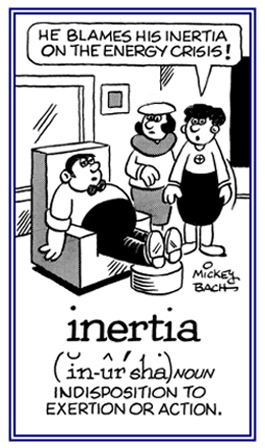You searched for:
“inertias”
1. The inability or unwillingness to move or to act: Karen was told by her fellow worker that it was not a lack of opportunity that hampered her from completing the project but simple inertia.
2. In physics, the tendency of a body to remain at rest or in motion until acted upon by an outside force: The inertia of many astronomical objects have been the same for centuries.
3. Inactivity; inability to move spontaneously; sluggishness: Old age has a strong influence on the inertia of most people. In fact, the older people become, the less inertia they have.
4. Resistance or disinclination to motion, action, or change: The inertia of an entrenched bureaucracy is nothing new.
5. Etymology: used as a term in physics during the 17th century by the German astronomer and physician, Johann Kepler (1571-1630); from Latin inertia, "unskillfulness, idleness"; from iners, inertis, "unskilled, inactive"; from Latin in-, "not + ars, artis, "skill, the method, way, an art, faculty". Used in Modern Latin by Newton (1687).

© ALL rights are reserved.

© ALL rights are reserved.
Go to this Word A Day Revisited Index
2. In physics, the tendency of a body to remain at rest or in motion until acted upon by an outside force: The inertia of many astronomical objects have been the same for centuries.
3. Inactivity; inability to move spontaneously; sluggishness: Old age has a strong influence on the inertia of most people. In fact, the older people become, the less inertia they have.
4. Resistance or disinclination to motion, action, or change: The inertia of an entrenched bureaucracy is nothing new.
5. Etymology: used as a term in physics during the 17th century by the German astronomer and physician, Johann Kepler (1571-1630); from Latin inertia, "unskillfulness, idleness"; from iners, inertis, "unskilled, inactive"; from Latin in-, "not + ars, artis, "skill, the method, way, an art, faculty". Used in Modern Latin by Newton (1687).
The sense of "apathy" was first recorded in 1822.


Go to this Word A Day Revisited Index
so you can see more of Mickey Bach's cartoons.
This entry is located in the following unit:
art-, arti-
(page 3)
Word Entries containing the term:
“inertias”
The lack of strong colonic muscular activity, often resulting in colonic distention and subsequent constipation.
This entry is located in the following unit:
art-, arti-
(page 2)
The ability of a material to store heat and to resist temperature changes, dependent on its density and specific heat.
This entry is located in the following units:
art-, arti-
(page 3)
thermo-, therm-, thermi-, -thermia, -therm, -thermal, -thermic, -thermias, -thermies, -thermous, -thermy
(page 20)
